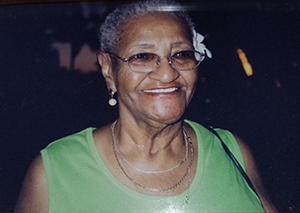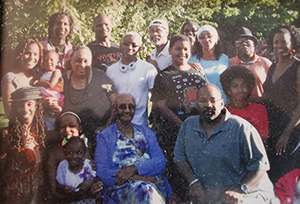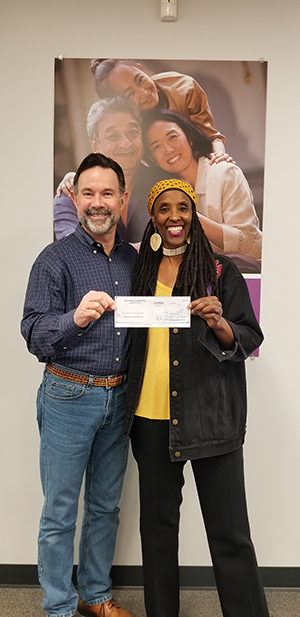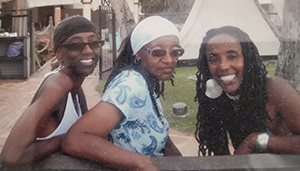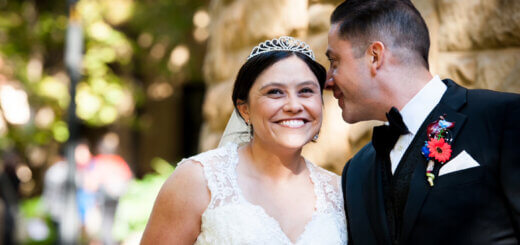Sacramento volunteer gives back to Black community
Written by Tahera Ali Khan
Debra Johnson shares the challenges she faced in getting a diagnosis for her mother and also her attempts to bring Alzheimer’s support to the Black community. Despite the death of her mother in 2013, Debra continues to dedicate her time to the Alzheimer’s Association®. She hopes that she can assist others in her community to educate themselves and gain the awareness and support needed to be effective caregivers.
There for her children
Lucinda Clayton, Debra’s mother, was a strong Black woman and a mother to five children. Whenever her children needed her, she was always there for them.
“She would do what was needed, to help you,” said Debra. “As a young woman living on my own, when attempting to take care of my business affairs over the phone for example, the representatives apparently knew that I was young and naïve. Feeling that I was getting the run around, my mother would say,” “˜give me the phone,’ and the rest was history.”
Difficulty with a diagnosis
According to a 2019 survey done by the Alzheimer’s Association, many medical school residency programs don’t offer much coursework related to Alzheimer’s and other dementias. Additionally, fewer than half of primary care physicians have received additional training in dementia care since medical school.
In 2008, Lucinda felt like something wasn’t right and she wanted answers as to why she was forgetting things. She asked her daughter, Deloris, to take her to the doctor.
However, her doctor was not helpful. He didn’t believe Lucinda had dementia and refused to even consider it as a possibility nor would he give her an in office cognitive assessment. Deloris, who was a retired nurse, was unable to make any progress with the doctor.
Debra volunteered to go with Deloris and her mother the next time they went to see their mother’s doctor. “I took off from work and it was almost like a showdown with the doctor about what he wasn’t going to do,” said Debra.
“After several attempts of asking him to give her mother the in-office assessment. He stated that we would need to find another physician. He refused to help us, at a time when we were seeking answers from the one person my mother respected and felt would help her.”
Debra believes that race may have played a part in their difficulty in getting a diagnosis. However, she has not ruled out the doctor’s lack of knowledge and an inability for him to adequately discuss such a sensitive subject. “I don’t think he would have reacted the same way with a White female,” share Debra. “Nor would he have settled for such insensitivity from a doctor for his mother.
“All he had to do was administer the in-office test or make a referral. But he refused to do it. His belief that it was just age was incorrect. It was not just age, I knew my mother, and as his patient, she was seeking answers.”
Caring for her mother
Debra and Deloris were able to find a new doctor for their mother who took the family’s concerns seriously. This new doctor did a thorough diagnostic assessment and gave Lucinda the Alzheimer’s diagnosis the family needed. Finally, they had a reason for what was causing her mother’s symptoms. This was a relief to Debra and Deloris, however, for the other family members it was the beginning of denial.
Knowing her mother would need full time care, Debra decided to retire early to help Deloris care for their mother. “It wasn’t a hard decision at all,” said Debra. “It was a necessary thing to do, I was able, and God put me in a position to retire. I could help alleviate the stress of my sister and be a partner in my mother’s care.”
As baby boomers get older, the number of people developing Alzheimer’s is growing. Some communities are impacted more than others. Nearly two-thirds of all Americans living with Alzheimer’s are women. Older Black Americans are twice as likely as older White Americans to have Alzheimer’s or another dementia.
Joining a support group
Debra found the Alzheimer’s Association in 2008 and threw herself into learning everything she could about the disease. One of the most helpful tools she found was a local support group.
When Debra attended, she saw that there were a lot of elderly White women and men. She said to herself, “These old people are not going to understand what I am going through,” She quickly found that they were so embracing.
On her first day in the support group Debra said, “I cried my eyes out and these people were right there ready to pick up the pieces. I learned that Alzheimer’s does not care if you are old, young, nor your nationality, it effects so many all over the world.”
From then on, Debra says, “I ran, not walked, to the weekly* support group.” The support group gave her exactly what it was designed to do, give her support.
Taking care of yourself
As Lucinda’s disease progressed Debra and her sisters enlisted the help of a paid caregiver, a special member of their church who their mother knew. Eventually, Lucinda’s daughters decided it was time for them to take a vacation, a time all caregivers need to relax and rejuvenate.
“Mama knew we were preparing to go on vacation for a week, however she believed she would remain alone and independent,” Debra said. “We knew we needed the additional assistance of the caregiver.”
Debra and her sisters came up with a plan to lean on their mother’s sense of pride and willingness to help others. “The plan was for the caregiver to tell Mama that her apartment was being renovated. She then asked Mama if she could stay with her for a week. Surprisingly, she turned and asked me what I thought, and I said, “˜That would be great, she could stay her while we go on vacation!'”
While Debra and her sisters were on vacation, they had a support system that consisted of Debra’s husband, brother-in-law, niece, sister-in-law and Lucinda’s good friends, all whom agreed to be scheduled to visit on specific days and times. “We wanted to spread out her visits so she would always have company,” said Debra. “Mama loved to have visitors. She loved to talk. That was a perfect fit.”
Starting her own support group
Knowing the importance of attending a support group, Debra wanted to bring that back to her community. “There are individuals experiencing this disease,” said Debra. “There were no Alzheimer’s Association support groups in the Black community.”
That same year, Debra decided to bring the support group to her church. With the combined help of her sister-in-law and the Alzheimer’s Association, they started a support group.
While they had attendees, it was not the number of participates they were hoping for. Debra said, “There were some people who came out, but not nearly the number of people that we knew were affected within our church or our community.”
Unfortunately, after nearly three years, Debra’s support group came to an end. The resistance of asking for help, was too great. “We sometimes limit ourselves when we continue to resist reaching out for help,” Debra said. “There are those who believe, what happens in the home, stays in the home! Therefore, based on the unwillingness of attendees to attend the group and share their experiences/challenges, the group was disbanded.”
Continuing to raise awareness
While she no longer facilitates a support group, Debra continues to raise awareness in the Black community and encourages families facing Alzheimer’s to seek support.
In hopes of educating the community about this disease, Debra sent out information to other Black churches in the Sacramento area. Her pastor helped, by writing an introductory letter so other churches would know who she was, who she represented, and her connection to both the disease and the church.
“I sent out 50 plus letters to Black churches in the Sacramento area,” said Debra. “I received one response. Even now in 2021 the resistance is still there. We have such a long way to go in order to destigmatize this disease, so people who need the services can feel that it is okay, to ask for help and receive it!
The importance of diversity
When Debra first started volunteering in 2009, she was disappointed that there weren’t larger numbers of Black staff and volunteers within the Northern California and Northern Nevada Chapter. “I really think it’s very important that the Alzheimer’s Association have an ethnically diverse staff,” said Debra. “Alzheimer’s affects people from all races and ethnicities.”
As part of a community who is disproportionately impacted by dementia, Debra knows the importance of having staff and volunteers who are “reflective of the people who need their assistance the most.” She has helped to recruit additional Black Alzheimer’s Association volunteers in the Sacramento area.
Helping others
Before the pandemic, one of the main volunteer activities Debra enjoyed was setting up a booth at health fairs. She was responsible for handing out literature and answering questions about the disease and the organization.
For Debra the most rewarding part of working at health fairs was the opportunity to listen to people’s challenges and lend support. Whether it was about a loved one with the disease or a family member who refused to offer help, Debra was there to listen. She would also encourage people to contact the free Alzheimer’s Association’s 24/7 Helpline at 800.272.3900 if there was anything else they needed.
“I want people to see the face connected with the Association,” said Debra. “I like going because African Americans who may have been apprehensive about approaching in the pass were now doing so. I like to think that it is because I was there.
“Ultimately, I love talking to any and every one that is seeking knowledge. I have no issues sharing my experiences as a means of letting them know they are not alone, and we are here to help.”
During the month of June, which is Alzheimer’s & Brian Awareness Month, Debra assembles a self-help table and bulletin board within her church that provides information for caregivers about the disease, and how to take care of themselves.
Volunteering during a pandemic
Because of safety concerns during the global pandemic, Alzheimer’s Association volunteers are not currently allowed to participate in in-person events. Not wanting to wait around, Debra has shifted her focus to do more virtual work such as delivering education programs and working with other Black volunteers to develop education programs tailored to the Black community. She also helped with last year’s Walk to End Alzheimer’s by wearing purple and walking within her own neighborhood.
One unexpected opportunity during this pandemic has been the ability for Debra to join other Black women and men on a monthly lunch hour Zoom meeting. “I’m able to build a relationship with people from Fresno to Bakersfield to the East Bay and even the state of Florida,” said Debra.
“It’s nice to see other Black women and men that have the same interests in getting information out to the community regarding Alzheimer’s. It’s rewarding to see so much interest.”
Debra misses coming into the office. “It has been a pleasure working with the Alzheimer’s Association,” said Debra. “After my first year, I received a birthday card and everyone in the office signed it! I was totally blown away. I feel like I’m more than just a volunteer, I’m a part of this family.”
Giving back to the community
In 2019, Debra and her husband spoke with their pastor and as a way to honor her mother, they started the Clayton-Johnson Respite Ministry. This ministry allows any member of their church who is caring for a loved one with Alzheimer’s or a dementia to obtain the services of a licensed respite agency of their choice who will be paid directly up to $2,000.
“This enables caregivers to have some rejuvenation time,” said Debra. “If you want to go on a vacation or have someone relieve you for a few hours or days out of the month so you can get away, you can do that. One important rule is that you have to utilize the entire $2,000. This is a way we can encourage the caregiver to take the time they need in order to return feeling somewhat renewed.”
Advice to other caregivers
Debra’s advice for new caregivers is to learn about Alzheimer’s. “It is important to educate yourself as much as you can on the disease,” said Debra. “Get all the information you can in order to do the best you can in providing care for your love one.”
Debra also encourages caregivers to practice forgiveness. “Give yourself a chance,” said Debra. “There may be times when things just don’t go the way you want them to. Forgive yourself and move on from that. Don’t have regrets, because regrets are a terrible thing to live with.”
The Alzheimer’s Association has resources for the Black community that can be found on our website here. If you’re interested in becoming a volunteer please visit alz.org/norcal/volunteer for more information.
* Currently, most support groups meet virtually once a month.
Learn more:





